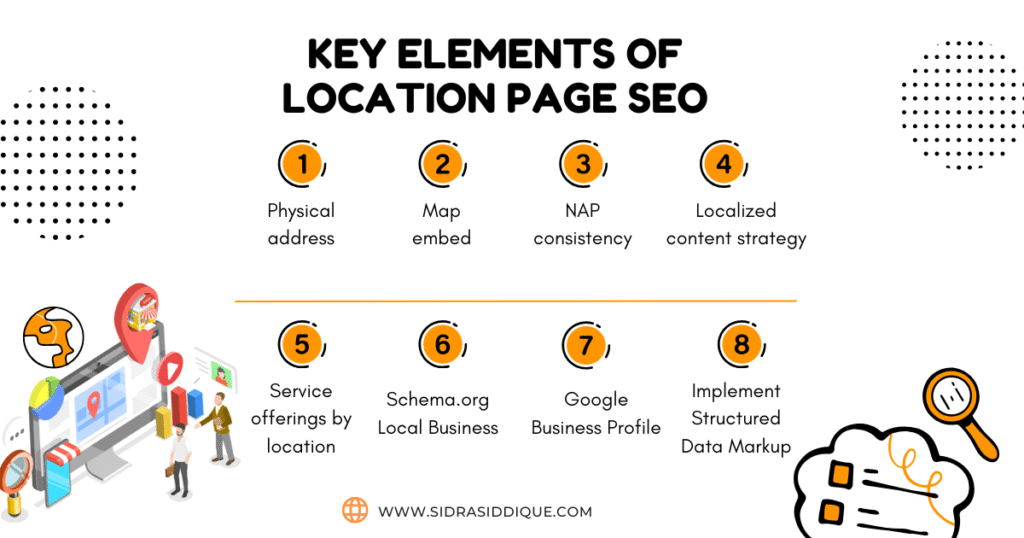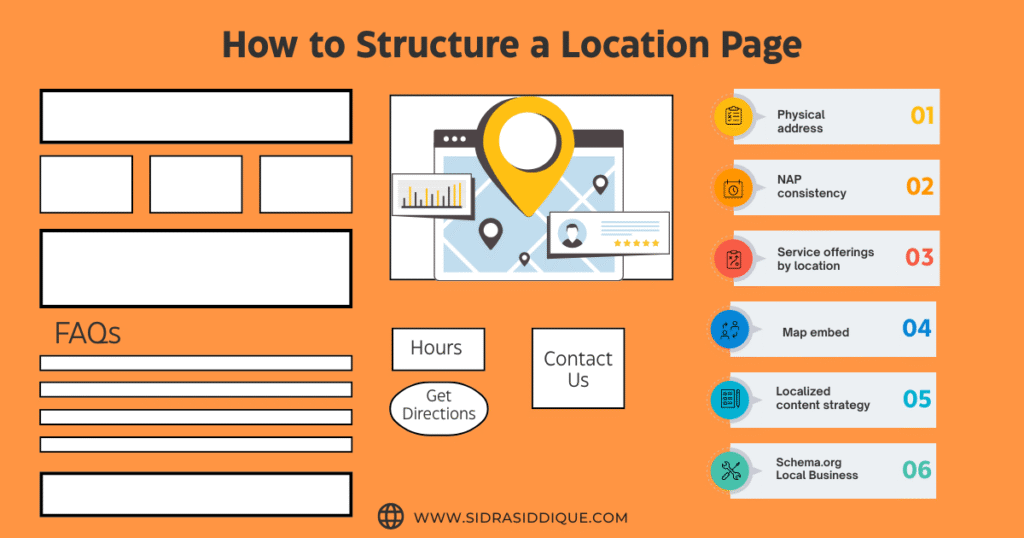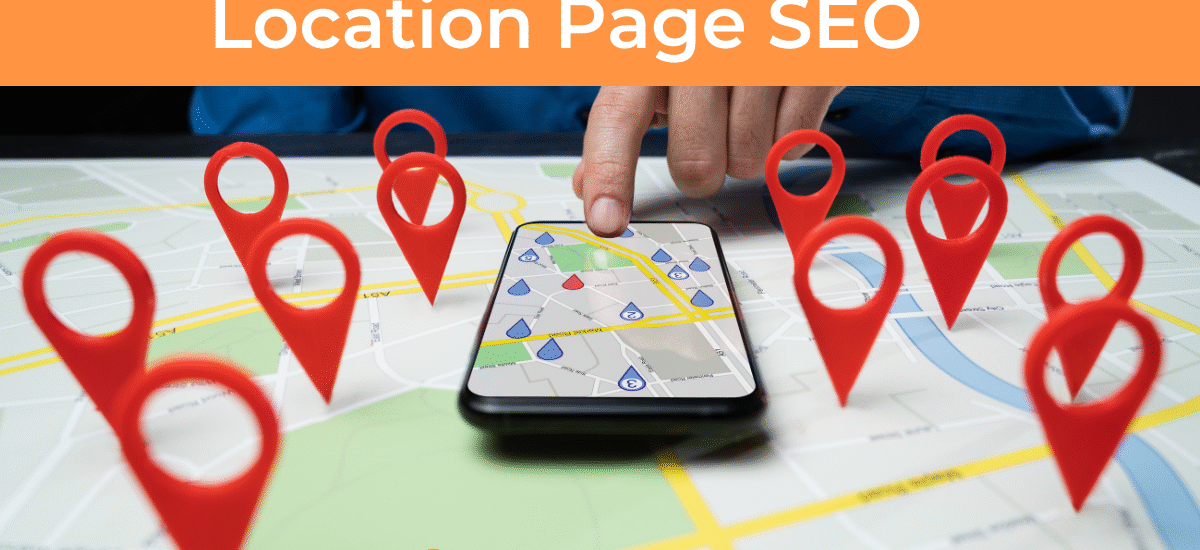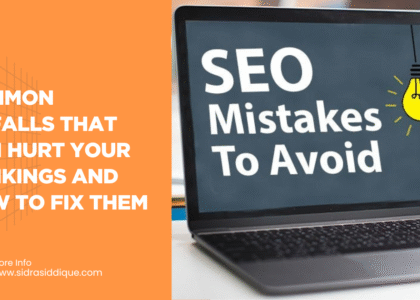Location Page SEO is the process of optimizing your business’s location-specific webpages to attract more local customers through search engines. When done right, it helps your business show up in local search rankings and appear for location-based queries like “best bakery in Lahore” or “plumber near me.” Whether you run a single store or manage multi-location SEO, you need strong pages tailored to each service area.
A well-optimized page improves your online visibility, brings more foot traffic, and builds trust with people searching nearby. This strategy is essential for brick-and-mortar businesses and service area pages trying to dominate local markets and grow steadily through organic search.
Why Location Page SEO Matters in 2025
Google wants to show the most relevant and nearby results. If your business has brick-and-mortar locations, you need store locator pages, service area pages, and accurate business location schema to appear in local results. Searchers want fast answers. They look for operating hours consistency, clear location-specific contact info, and reliable local keyword strategy. Businesses that focus on NAP consistency (Name, Address, Phone) and localized content strategy see higher local search rankings.
Google also checks your LocalBusiness schema markup and uses structured data for local SEO. If your website has semantic content structure, your business will rank higher. You should also monitor search volume by location using a Position Tracking tool or Zip code-based tracking. This way, you can keep track of your keywords and performance in each area.
What Makes a Great Location Page
A good location page must speak to a person looking for your product or service in their city. It must answer common questions, show trust, and match location-specific user intent. For example, if someone searches for a “law firm in New York”, the page should talk about legal services offered in New York, have client reviews from there, and include a Google Map embed.The page should be mobile-ready. With so many people searching on phones, mobile-friendly design is no longer optional. Use a conversion-optimized layout with a strong Call to action (CTA) like “Visit Us Today” or “Book an Appointment.” Include visual content for trust, like photos of the team or office. And don’t forget to include customer trust signals such as ratings, testimonials, and reviews.
Key Elements of Location Page SEO
To build a page that ranks and converts, include these important elements:
| Element | Why It’s Important |
| Physical address SEO | Helps Google verify your location |
| Map embed SEO | Shows your spot on the map clearly |
| NAP consistency | Builds trust and matches directory listings |
| Localized content strategy | Speaks directly to people in that area |
| Service offerings by location | Tailors your content to specific needs |
| Schema.org LocalBusiness | Makes your info readable by Google |
| Google Business Profile | Connects your site with your local listing |
Include details about your service area pages or neighborhood targeting. These help cover broader regions while staying locally relevant. If you serve many nearby cities, use geo-targeted content to cover each place.

Common Mistakes to Avoid
Many businesses create one general page for all locations. This hurts your geo-relevance and lowers your chances of showing up in local search optimization results. Another mistake is missing or outdated NAP details. If your local business SEO details aren’t correct everywhere, Google won’t trust your site.
Don’t forget to write unique content for each location. Copy-pasting content for different cities will not help. Google looks for location-specific user intent and semantic content structure, not repeated paragraphs. Keep each page relevant with local details, events, and offers
How to Structure a Location Page
Your page should be clean, simple, and full of value. Start with a headline using your main city keyword. For example: “Best Pediatric Dentist in Chicago.” Then add a short intro explaining what you offer. Follow it with location details, Google Map embed, office hours, services provided, and local reviews.
Use headings like H2 or H3 to break up content. These should include your target city or zip code. For example, “Dental Services in 60616” or “Why Families in Hyde Park Choose Us.” Use on-page SEO elements like meta title, description, and alt text for images. Also, add an FAQ section. Answer common questions to match FAQ for local services and boost your visibility.

Case Study: Local SEO Success Story
A small bakery in Austin added separate city-specific landing pages for each delivery area. Each page included unique content, a map, photos, local offers, and business directories links. Within three months, their traffic grew by 47%. They also saw more orders from nearby neighborhoods. Why? Their content matched the location-specific user intent and used a solid local keyword strategy.
Final Thoughts: Stay Ahead in Local SEO
In 2025, the path to local search rankings is clear. You need smart content, a strong site structure, and accurate data. Use structured data for local SEO, create responsive landing page design, and update your LocalBusiness schema markup. Make every location page SEO-ready with real details and value.
When someone searches for “coffee shops near me”, be the first name they see. Focus on online visibility, conversion-optimized layout, and user experience (UX). That’s how you grow your business, gain trust, and stay ahead in the local game.
FAQs About Location Page SEO
What are location pages?
Location pages are dedicated web pages that show a business’s services or presence in a specific city or area. They help users and search engines find relevant local content tied to a physical address.
Will adding a service location page to a website help SEO?
Yes, adding a service area page improves local search optimization by targeting specific cities or regions, helping you rank for location-based queries.
What is location-based SEO?
Location-based SEO is the process of optimizing your site to appear in local search rankings, especially for queries like “coffee shops near me” or “dentist in [city]”.
Do landing pages affect SEO?
Yes, well-optimized landing pages can improve on-page SEO elements, increase conversions, and boost online visibility for targeted services.How to write a location page?
Write unique, localized content with the city name, services offered, business directories, NAP consistency, Google Map embed, and schema markup to meet local keyword strategy and user intent.




